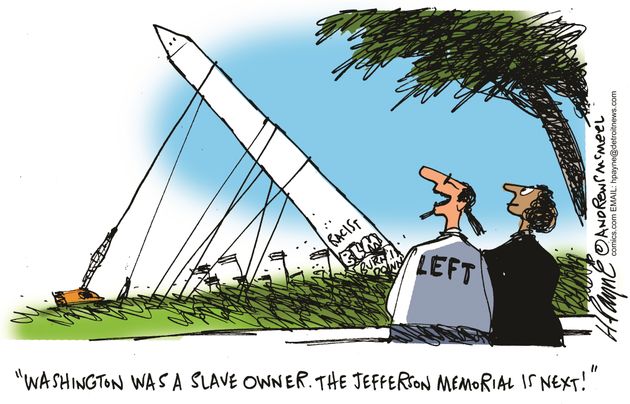
Essay written by Colonel Race in "RedState":
If you would like to surprise me, tell me that you have heard of Daniel J. Boorstin. If you want to impress me, tell me you know who he is. For those of you who haven’t already googled him, he was comfortably one of the major intellectuals of the second half of twentieth century. A communist while at Harvard, he moved to conservatism with the advent of the Second World War.
I was first introduced to him as a history major in the late sixties as one of his accomplishments was being not only a factual historian but a major figure in the theory of history. By chance, I recently came across an essay he wrote which appeared in Newsweek almost 50 years ago in July 1970.
In the essay, entitled “Hypochondria in America” Boorstin’s premise was that while the country was divided, it really wasn’t as sick as it appeared because the conflict was between the more extreme elements of the Left and the Right. However, because this conflict was dominant in the public discourse it appeared to be the defining element of our society.
Our Nation was sick because Americans had lost their sense of history. He stated that because we were “obsessed by where we are, we forget where we came from and how we got here. I had to chuckle when he lamented the fact that this obsession was fueled by new headlines every day. Now, our obsessions of the sickness of the Nation are fueled by headlines every 5 minutes.
Boorstin’s advice was that if Americans were more attuned with history they would be able to take a long view perspective of their current situation and realize that they could seek solutions rather than just react to events. This is where we are today; no one is looking in a historical context. In a sense, with new the headlines every 5 minutes, events that happened more than a month ago may never well as happened. We only have time to react to the pixels generated before us.
As I read through the essay, on one hand I found how uncanny it was in its applicability to now, 50 years on from its then. Are our young people in ignorant turmoil? Yes. Does the country have race relation challenges now as then? Yes. Are there extremes of polarization in our politics? Yes. But, are there significant differences? Is there some fundamental change in our Nation that exceeds the obvious parallels as presented.
My degree is in history and I have always tried to place current events in the context of a historical perspective. I came to the conclusion that where we are now as a society has, in fact, changed in a very fundamental way.
In 1970, there was unquestionably a sense of nation. Hubert Humphrey had lost the election 2 years prior but I don’t think anyone in the Republican Party viewed him as a Democrat first and an American second. While there were significant differences in opinions on the direction of the ship of state, there was no doubt that there was a ship of state. While there could be significant contention concerning domestic policies and even where the might of the United States should be applied internationally, there was the always the shared goal of the preservation of the Republic.
The fundamental change that I see now is that there is no longer a shared goal in the preservation of the Republic. One of the fundamental core principles of a Republic is the necessity to accept the result of elections. We saw this in its purest form when Nixon conceded to JFK despite obvious widespread fraud in Illinois. We saw this fundamentally change when Al Gore refused to accept the results in Florida.
At the time I saw Gore’s refusal and his willingness to challenge the election as an exceedingly dangerous precedent and I’ve been proven correct. Not only did the Democrats never accept the legitimacy of the Bush presidency, we now see not only do they not accept the legitimacy of the Trump presidency, they have used seditious forces to overturn the election.
Once factions in a Republic refuse to accept the legitimacy of their officeholders the natural fractures in a society become increasingly large fissures. These fissures physically divide the People and the factions out of power refuse to be governed by the factions in power. As such, the concept of a nation ceases to exist. This is where we are now.
I think very few of you would argue that the Democrats will be willing to accept the legitimacy of the next election. Further, I think most will agree that not only will they not accept legitimacy they will continue to use whatever means possible to undermine its legitimacy and will expend all of their energy in that opposition rather than seeking ways to unite the country and move the country forward politically and socially.
So is there historical context to view events of today? There is, unfortunately. The last time that the country was irreparably fractured based upon the unwillingness of one faction to be governed by the other faction was just prior to the Civil War. In the course of human history, when people stop listening they start fighting and we’re at the point where neither side wants to listen at all.
If our society had the perspective of history we would know what happens next and perhaps we would step back. Without the perspective of history, we have nothing to step back to. The Nation is not a hypochondriac as it was in Boorstin’s time, the Nation is terminal.
https://www.redstate.com/diary/colonel-race/2020/06/18/i-told-you-it-was-sick/
